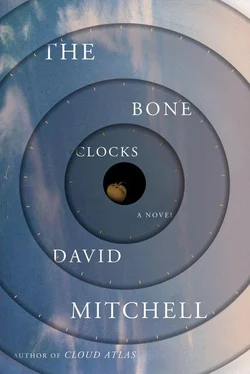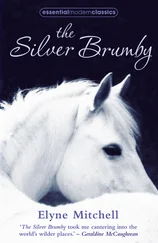Inez’s expression says, I hope you’re right , and she goes to park the car in a nearby underground lot. Unalaq ushers us up the steps, inside, down the hallway, and into the tiny elevator. There’s not enough space for Ōshima, who lopes up the stairs. I press up.
A dollar for your thoughts, subsays Unalaq .
One’s thoughts cost only a penny when I was Yu Leon.
Inflation , shrugs Unalaq, and her hair goes boing. Could Esther really be alive somewhere inside this head?
I look at Holly’s lined, taut, ergonomic face. She groans like a harried dreamer who can’t wake. I hope so, Unalaq. If Esther interpreted the Script correctly, then maybe. But I don’t know if I believe in the Script. Or the Counterscript. I don’t know why Constantin wants Holly dead. Or if Elijah D’Arnoq’s for real. Or if our handling of the Sadaqat issue is wrongheaded. “Truly, I don’t know anything,” I tell my five-hundred-year-old friend.
“At least,” Unalaq blows the end of a strand of copper hair from her nostril, “the Anchorites can’t exploit your overconfidence.”
HOLLY’S ASLEEP, ŌSHIMA’S watching The Godfather Part II , Unalaq’s preparing a salad, and Inez has invited me to play her Steinway upright, as the piano tuner came yesterday. There’s a fine view of Waverly Place from the piano’s attic, and the small room is scented with the oranges and limes that Inez’s mother sends in crates from Florida. A photograph of Inez and Unalaq sits atop the Steinway. They’re posing in skiwear on a snowy peak, like intrepid explorers. Unalaq won’t have discussed the Second Mission with her partner, but Inez is no fool and must sense that something major is afoot. Being a Temporal who loves an Atemporal is surely as thorny a fate as being an Atemporal who loves a Temporal. It’s not just Horology’s future that my decisions this week will shape, but the lives of loved ones, colleagues, and patients who will get scarred if my companions and I never come back, just as Holly’s life was scarred by Xi Lo — in — Jacko’s death on the First Mission. If you love and are loved, whatever you do affects others.
So I leaf through Inez’s sheet music and choose Shostakovich’s puckish Preludes and Fugues . It’s fiendish but rewarding. Then I perform William Byrd’s Hughe Ashton’s Ground as a palate cleanser, and a handful of Jan Johannson’s Swedish folk songs, just because. From memory I play Scarlatti’s K32, K212, and K9. The Italian’s sonatas are an Ariadne’s thread that connects Iris Marinus-Fenby, Yu Leon Marinus, Jamini Marinus Choudary, Pablo Antay Marinus, Klara Marinus Koskov, and Lucas Marinus, the first among my selves to discover Scarlatti, back in his Japanese days. I traded the sheet music off de Zoet, I recall, and was playing K9 just hours before my death in July 1811. I’d felt my death approaching for several weeks, and had put my affairs in order, as they used to say. My friend Eelattu cut me adrift with a phial of morphine I’d reserved for the occasion. I felt my soul sinking up from the Light of Day, up onto the High Ridge, and wondered where I’d be resurrected. In a wigwam or a palace or an igloo, in a jungle or tundra or a four-poster bed, in the body of a princess or a hangman’s daughter or a scullery maid, forty-nine spins of the earth later …
… in a nest of rags and rotten straw, in the body of a girl burning with fever. Mosquitoes fed on her, she was crawling with lice, and weakened by an intestinal parasite. Measles had dispatched the soul of Klara, my new body’s previous inhabitant, and it was three days before I could psychoheal myself sufficiently to take proper stock of my surroundings. Klara was the eight-year-old property of Kiril Andreyevich Berenovsky, an absentee landlord whose estate was bounded by a pendulous loop in the Kama River, Oborino County, Perm Province, the Russian Empire. Berenovsky returned to his ancestral lands only once a year to bully the local officials, hunt, bed virgins, and exhort his bailiff to bleed the estate even whiter than last year. Happiness did not enter feudal childhoods, and Klara’s was miserable even by the standards of the day. Her father had been killed by a bull, and her mother was crushed by a life of childbearing, farmwork, and a peasant moonshine known as rvota , or “puke.” Klara was the last and least of nine siblings. Three of her sisters had died in infancy, two others had gone to a factory in Ekaterinburg to settle a debt of Berenovsky’s, and her three brothers had been sent to the Imperial Army just in time to be butchered at the Battle of Eylau. Klara’s recovery from death was greeted with joyless fatalism. It was a long fall indeed from Lucas Marinus’s life as a surgeonscholar to Klara’s dog-eat-dog squalor, and it was going to be a long, fitful, fretful climb back up the social ladder, especially in a female body in the early nineteenth century. I did not yet possess any psychosoteric methods to speed this ascent. All Klara had was the Russian Orthodox Church.
Father Dmitry Nikolayevich Koskov was a native of Saint Petersburg who baptized, preached to, wed, and buried the four hundred serfs on the Berenovksy estate, as well as the three dozen freeborn workers who lived and worked there. Dmitry and his wife, Vasilisa, lived in a rickety cottage overlooking the river. The Koskovs had arrived in Oborino County ten years before, full of youth and a philanthropic zeal to improve the lives of the rural peasantry. Long before I-in-Klara entered their lives, that zeal had been killed by the drudgery and bestiality of life in the Wild East. Vasilisa Koskov suffered from severe depression and a conviction that the world was laughing at her childlessness behind her back. Her only friends on the estate were books, and books can talk but do not listen. Dmitry Koskov’s ennui matched his wife’s and he cursed himself, daily if not hourly, for having forfeited the prospects of clerical life in Saint Petersburg, where his wife and his career could have blossomed. His yearly petitions to the church authorities for a pulpit closer to civilization proved fruitless. He was, as we’d say now, seriously Out of the Loop. Dmitry had God, but why God had condemned him and Vasilisa to sink in a bog of superstition and spite and sin like Oborino County for a landlord like Berenovsky, who showed more concern for his hounds than his serfs, the Almighty did not share.
To me-in-Klara, the Koskovs were perfect.
ONE OF KLARA’S chores, as soon as she was well again, was to deliver eggs to the bailiff, the blacksmith, and the priest. One morning in 1812, as I handed Vasilisa Koskov her basket of eggs at the kitchen door, I asked her shyly if it was really true I’d meet my dead sisters in heaven. The priest’s wife was taken aback, both that the near-mute serf girl had spoken, and that I’d asked such a rudimentary question. Didn’t I listen to Father Koskov in church every Sunday? I explained that the boys pinched my arm and tugged my hair to stop me listening to God’s Word, so although I wanted to hear about Jesus, I couldn’t. Yes, I was mawkishly, hawkishly manipulating a lonely woman for my own gain, but the alternative was a life of bovine labor, piggish servitude, and bile-freezing winters. Vasilisa brought me into her kitchen, sat me down, and taught me how Jesus Christ had come to earth in the body of a man to allow us sinners to go to heaven after we died, so long as we said our prayers and behaved as good Christians.
I nodded gravely, thanked her, then asked if it was true the Koskovs were from Petersburg. Soon Vasilisa was reminiscing about the operas, the Anichkov Theater, the balls at this archduke’s name day, the fireworks at that countess’s ball. I told her I had to go, because my mother would beat me for taking too long, but the next time I delivered the eggs, Vasilisa served me real tea from her samovar sweetened with a spoonful of apricot jam. Nectar! Soon the melancholic priest’s melancholic wife found herself discussing her private disappointments. The little serf listened with wisdom far beyond her eight years. One fine day, I took a gamble and told Vasilisa about a dream I’d had. There was a lady with a blue veil, milky skin, and a kind smile. She had appeared in the hut I shared with my mother, and told me to learn to read and write, so that I could take her son’s message to serfs. Stranger still, the kind lady had spoken strange words in a language I didn’t understand, but they had stayed glowing in my memory, just the same.
Читать дальше












